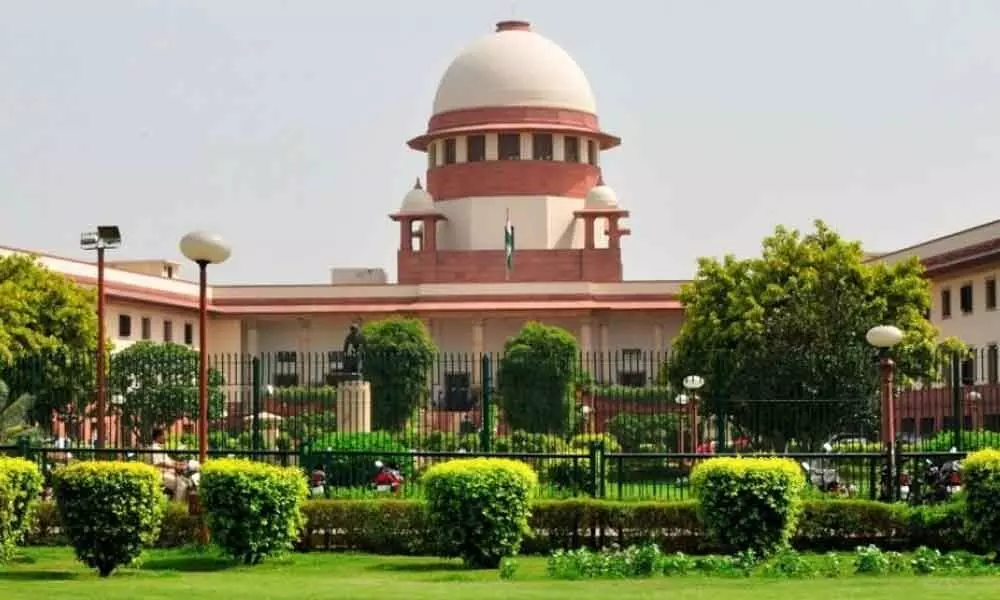Live
- Over 7,600 Syrians return from Turkiye in five days after Assad's downfall: minister
- Delhi BJP leaders stay overnight in 1,194 slum clusters
- Keerthy Suresh and Anthony Thattil Tie the Knot in a Christian Ceremony
- AAP, BJP making false promises to slum dwellers for votes: Delhi Congress
- 'Vere Level Office' Review: A Refreshing Take on Corporate Life with Humor and Heart
- Libya's oil company declares force majeure at key refinery following clashes
- Illegal Rohingyas: BJP seeks Assembly session to implement NRC in Delhi
- Philippines orders full evacuation amid possible volcanic re-eruption
- Government Prioritizes Welfare of the Poor, says Dola Sri Bala Veeranjaneyaswamy
- Two Russian oil tankers with 29 on board damaged due to bad weather
Just In
Can't pay Rs 4 lakh compensation to Covid victims, Centre tells Supreme Court


Supreme Court (Photo/IANS)
The Centre has informed the Supreme Court that the finances of states and Centre are under severe strain, due to the reduction in tax revenues and increase in health expenses on account of the coronavirus pandemic
New Delhi: The Centre has informed the Supreme Court that the finances of states and Centre are under severe strain, due to the reduction in tax revenues and increase in health expenses on account of the coronavirus pandemic. And Rs 4 lakh compensation can't be paid to all those who died due to Covid-19 as it would exhaust the disaster relief funds, and also impact the Centre and states' preparation to address future waves of COVID-19.
In an affidavit, the Ministry of Home Affairs submitted that ex-gratia relief under the Disaster Management Act, 2005, to 12 notified disasters is provided through the State Disaster Response Fund (SDRF), and the annual allocation for the year 2021-22 for SDRF, for all states combined is Rs 22,184 crore. "Therefore, if ex-gratia of Rs 4 lakh is given for every person, who lost life due to COVID-19, the entire amount of SDRF may possibly be spent on this alone, and indeed the total expenditure may go up further", said the affidavit.
The MHA argued that the finances of states and Centre are under severe strain, due to the reduction in tax revenues and increase in health expenses on account of the pandemic. MHA stressed that utilisation of scarce resources for giving ex-gratia, may have unfortunate consequences of affecting the pandemic response and health expenditure in other aspects and hence cause more damage than good.
"It is an unfortunate but important fact that the resources of the Governments have limits and any additional burden through ex-gratia will reduce the funds available for other health and welfare schemes", added the affidavit.
The MHA contended that unlike floods, earthquake, cyclone, etc, during the ongoing COVID-19 pandemic, thousands of crores of rupees have been spent by Centre and states on prevention, testing, treatment, quarantine, hospitalization, medicines and vaccination, etc and it is still continuing. "It is not known that how much more is required. Thus, Central and State Governments are taking all possible measures to prevent and prepare for future waves of COVID-19", said the affidavit.
The affidavit has been filed in response to a PIL seeking "minimum standards of relief" and ex-gratia payment to Covid-19 deceased.
The Centre emphasized the compensation of Rs 4 lakh cannot be paid to those who succumbed to COVID-19, as the disaster management law mandating compensation applies only to natural disasters like earthquake, floods etc. "Due to its scale and impact, it would not be appropriate to apply the scheme of assistance, eligible for natural disasters, to the epidemic", added the MHA.
The MHA said under the Pradhan Mantri Garib Kalyan Yojana Package announced in March, 2020, the government has provided insurance cover of Rs 50 lakh per person. The MHA contended this insurance cover has been made available from the inception of the pandemic and it provides a sum more than 12 times larger than the sum being sought in the writ petition.
Contesting Rs 4 Lakh ex-gratia, the Centre insisted that a broader approach, which involves health interventions, social protection, and economic recovery for the affected communities, would be a more prudent, responsible and sustainable approach.
"It is further submitted that, in the case of various disasters, for which such ex-gratia is provided under SDRF norms, the disaster is of a short and finite duration, occurring and ending quickly. There is no precedent of giving ex-gratia for an ongoing disease or for any disaster event of long duration, extending for several months or years", said the affidavit.
The petition by advocates Gaurav Kumar Bansal and Reepak Kansal had referred to Section 12 of the Disaster Management Act 2005. The section said national authority shall recommend guidelines for the minimum standards of relief for persons affected by disaster, which shall include ex-gratia assistance.

© 2024 Hyderabad Media House Limited/The Hans India. All rights reserved. Powered by hocalwire.com






